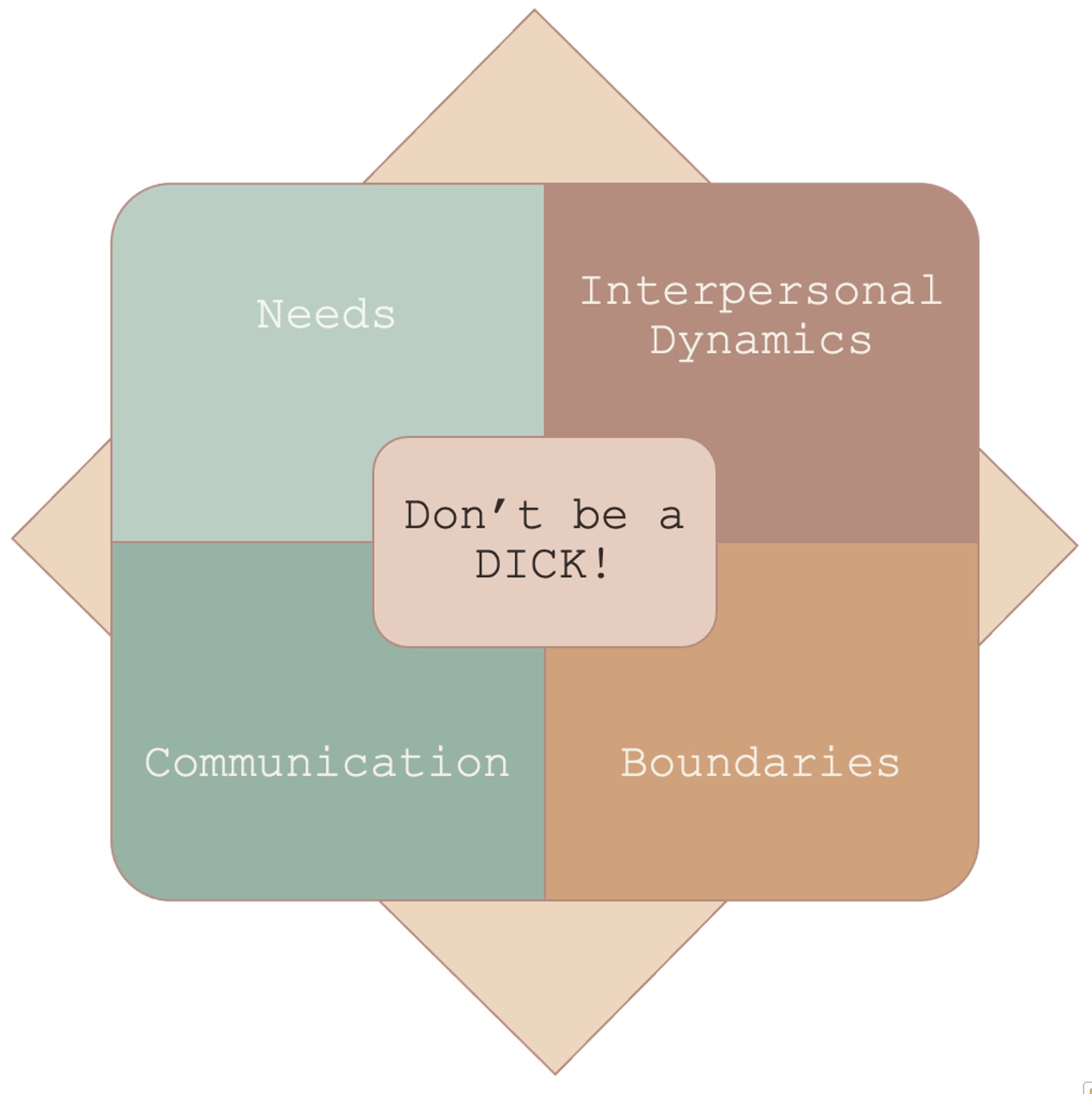Blog
Today we deep dive into the needs quadrant of our model. Negotiating our needs is a key skill - it is not a lose-win win-lose game that we so often find ourself playing when it's hard.

Follow the default fear-based pathway of the human condition and stress, arguments, blame, feeling victimised can all easily ensue.
Learn how to do it well and negotiating our needs not only builds connection and trust but also gives us an inner experience of personal freedom and acceptance too.
It's also really insightful to realise 'when' we find it hard, as we are all pretty good at negotating our needs most of the time in fact. We will just have certain situations that trigger us into an unhelpful pattern that serves us to upgrade.
For example I remember becoming extremely frustrated in a particular situation that was unfolding in a high-pressure, high-performance environment I was working in.
I loved working for my boss as she drove me to be better. I was busting my ass to deliver to expectations that became ever higher and unrealistic to fit into my working week. Yet I did not feel that it was at all viable from a career point of view, to express much of the pressure I was feeling as I powered my way towards burnout.
Someone new joined the team. In our meetings where I felt we were expected to suck it up and power through, she would speak up and say "oh you might notice my face looks like I'm disengaged, I'm not, I'm just exhausted" and my boss would say "oh let's take a break, give her a chance to take a little rest and reset". She would say things like "I'm an introvert, this is so exhausting for me" and again she would get let off the hook.
Quite honestly, I became enraged. WTF! Thankfully I remembered work on boundaries and how frustration is a helpful signal that our needs or something we value is being squashed. A new boundary is needed.
After some reflection I realised I was angry at myself. I was unable to speak up for my needs and felt it was career limiting, yet someone else was not only speaking up for their needs, releasing pressure from themselves but also seemingly shining in the eyes of leadership and boosting their career in the process.
This reflection and realisation is the first step of the upgrade process.
I notice a similar pattern in my Couples Therapy practice. Perhaps without initially realising it, one slowly, over time loses themself as they focus on meeting the needs of their partner. They squashes their needs, their feelings, to fit in with the other. Frustration builds, sometimes to such an extent that depression occurs.
What's so interesting is that this often isn't anything to do with the other. Their partner isn't demanding this. It just becomes a default pattern they fall into that becomes more extreme over time. Until POP! One just can't take any more. It's over. Finished, beyond repair yet with little warning.
Digging under the surface, the partner may often complain they had no idea at all that one was unhappy at all. They are mystified, confused. Lost. They believed their partner was rather passive and compliant, easy going and happy with how thing were.
Having first reflected and realised we are in an uphelpful pattern, how can we upgrade, how can we switch up the pattern and get a better outcome? New are strategies needed!
I now share with you 6 very practical strategies that help you upgrade your inner operating system, to understand your needs, speak up for them without causing drama and change your world for the better:
1. Listen to yourself - what do you need or what that matters to you has been squashed?
Frustration holds the keys to freedom. It reminds us we need to speak up for what matters to us, to create a new boundary e.g
- I'm feeling brittle and at my limit, I need some quiet time to myself.
- I feel resentful that I am always the one to.... I need to ask for help doing...
- I start to resent my work. I need to give myself a break.
2. Express your needs *without blame*
Marshall Rosenberg's work on Non Violent Communication [NVC] is amazing. We so often accidentally trigger drama by making our other feel blamed, even if we don't mean to.
NVC helps us avoid this and talk from our needs, from the place of I not you. For example:
- Say I feel... when... because.... I need....
- Avoid saying You.... Always... Never....
A real world example might bring this to life:
Sam before NVC: This place is a pigsty! It's such a mess!
Nav: Aaaarg! I hate it when you say that. It literally drives me mad!
< Uuuuurgh. Row ensues. No one feels good. Nav feels blamed, defensive. It doesn't even occur to Sam that Nav feels blamed, she thinks he likes living in a mess. In fact, Nav thinks Sam is the messy whirlwind and feels a bit resentful because he notices the place stays tidy when Sam's away. >
Sam after NVC: Oooooh, I feel so overwhelmed. I'm stressing out. I can't think straight when the place is messy and I have so much work I need to do. Can you help me Nav, just 30 mins to sort things out?
Nav: Hugs Sam. Yep give me a minute to finish this.
Nav later on: Jokingly - you do realise this place stays tidy when you're away?
This is also a great reminder that only one person needs to change their side of a pattern, for a pattern to shift.
3. Learn how to say No more skilfully
Simple patterns help us here: For example:
- Thank you so much for asking, I can't this time.
- I'd love to do this with you - I can't this week, can we do another time?
- I know that's important to you, I can't take you there this time, can you ask xxx?
- I appreciate you asking, this is not for me.
Google ‘how to say no' and you'll find a wealth of resources at your fingertips.
4. Build your resilience and saying No muscle
Remember that changing a pattern is hardest right at the very beginning. When you start to speak up, you are more likely to need to hold your line a bit more firmly than later on when they understand and realise you mean it. Here are some very practical tips to help you.
Make an ‘if/then' plan: When xxx comes up, I'll say xxxxx. This kind of plan makes it around 600% more likely that you'll speak up and say what matters most....and we all have a situation in which we find it hard to speak up.
Kick your limiting beliefs into touch: It seems we don't speak up for our needs and get ourself trapped in a pit of frustration because we...
....don't want to cause a fuss
...don't want to cause a row
....feel our partner won't listen anyway
...think their needs are more important than ours
BUN THAT! Not speaking up is a mistake.
We are not being authentic. We are hiding a part of us that could in fact bring us closer in relationship. No wonder you feel they don't know you, you're not sharing yourself with them.
5. Avoid all or nothing fundamentalism
We train people how to treat us. Consistency matters. Yet I'm reminded that the 80:20 rule exists in everything.
It is never good in anything to be inflexible, at an extreme. All or nothing keeps us unnecessarily limited.
By all means go to bed regularly at 9pm if that's the boundary that matters to you - flexing from time to time for special occasions will show those people you really care and save you from the isolation that often results from fundamentalism...
6. Explore the many ways your needs can be met
Realise it's actually you that needs to show up for you...
When I started volunteering as a mentor for young unaccompanied migrants, I found it easy to leave work in my high pressure program management role once a week at 4:30pm - rather my usual time of 7pm. There were zero consequences to my work for doing this, in fact I felt more motivated and happy in my life as a result.
Did I need anyone else to meet my needs? No. I needed me to step up, own my own needs and do what mattered to me.
From my coaching practice, I would say 80% of the time we are held back by our own limitations, there isn't in fact anyone else or anything else getting in the way, just our own deep and unconscious limiting beliefs.
...and remember, beliefs are just a thought we keep thinking. Change your thinking patterns, change your life.
The irony, the human condition that keeps us trapped is thinking we need to hide our true self to fit in, to play small and be who we think others want or need us to be is exactly what keeps us isolated and unhappy.
Connection comes from vulnerability. Vulnerability requires bravery and resilience. Muscles that need practice. If you feel that no one really knows you, that your needs are being trampled, the one who can change this is YOU.
Shame is a very powerful and inescapable part of our human condition that can keep us small. Your world around you needs you to be the fullness of who you are.
Making strategies like the 6 I've shared with you today part of your inner operating system will help you find clarity, speak up for your needs with simplicity and greater ease and find the freedom to be who you really are.
Ah relief!
I'd love to how this lands with you? Have you already tried some of these strategies and can share your experience? What else might have helped you on your journey?
Why not share this article with someone you know who might benefit?
Add a comment:
YouTube
Here I walk you through step by step many useful and practical techniques for emotional intelligence and how to make friends with your mind.
And provide you with other resources that may help you grow including meditation and more.
Release Fear
15 min guided meditation set to soft music to help you calm, soothe and release fear.








